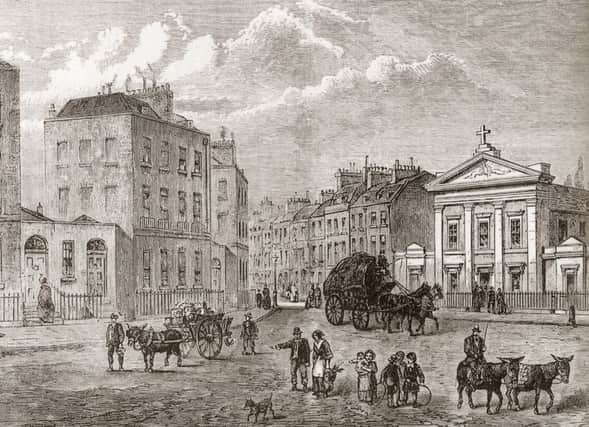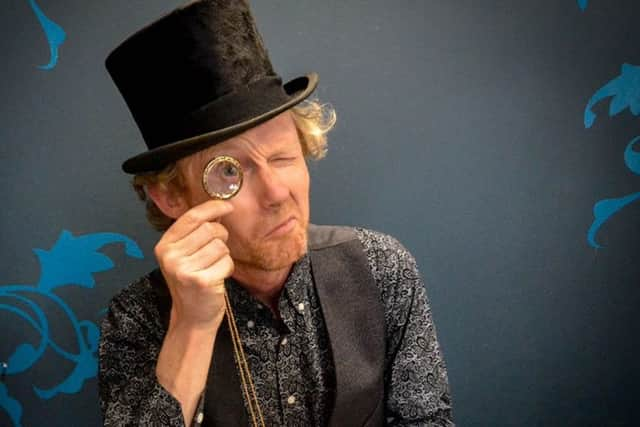SHORT STORY FOR THE WEEKEND: Dancing on the Dead by William Sutton
This article contains affiliate links. We may earn a small commission on items purchased through this article, but that does not affect our editorial judgement.


Lucy Talbot was a beautiful woman, living an ugly life.
It was 1861. Cholera had broken out. As St Paul’s chimed the hour, I walked through dirty streets, with my urchin friend Worm. Such poverty, so near the City. These slums still housed navvies and street girls.
A red-faced man in a dog collar emerged from the Talbots’. The vicar patted his stomach, his cheeks bright in the dark alley.


I introduced myself as a policeman. ‘You know the Talbots?’
Advertisement
Hide AdAdvertisement
Hide Ad‘Too well, Sergeant Lawless. Buried three last year. Just made arrangements for Mr Talbot.’ Pastor Peacock gave a sympathetic smile. ‘Be kind, whatever your business. Mrs Talbot has suffered.’
What my business was, I was not yet sure.
Lucy Talbot opened the door out of breath, cheeks flushed, but not with health.


She rearranged her dress. The room smelt of damp clothes and death. A teapot stood on the stove. I poured a cup to revive her. ‘Calm yourself. Your husband’s employer asked me to pay this visit.’
Her eyes widened. ‘Sir Joseph?’
Sir Joseph Bazalgette was that rare beast: a kind employer. When three Talbot boys died in his sewers, he compensated the family. Now Bazalgette feared for Mrs Talbot.
Advertisement
Hide AdAdvertisement
Hide AdI was suspicious. With this cholera, wives often poisoned husbands, and lived off the insurance.
‘Bazalgette is concerned.’ I watched her closely. ‘For your loss.’
Three tots played fearfully in the corner. They were right to be afraid – but not of me. I knew that smell: cholera. The tears Lucy fought to hide convinced me: she did not kill her husband; cholera did.
I felt ashamed of suspecting her. ‘Funerals are expensive, I suppose.’
Advertisement
Hide AdAdvertisement
Hide Ad‘Funerals?’ She stared. ‘Ain’t no funerals for us. Funerals is for the rich. Thirty shillings. No carriage, no lace; no discount for returning customers.’
True. Few city churches had graveyards large enough to avoid spreading contagion. ‘Please, let Bazalgette pay for the burial.’
‘Parson Peacock beat yous to it.’ Her distaste for the clergyman was palpable. ‘Roaring business he does.’
I was too late. ‘Where is your husband buried?’
‘If only I knew, sergeant.’ Tears welled up. ‘If only I done proper by him...’
***
On Sunday, I watched Peacock’s congregation flood out.
Advertisement
Hide AdAdvertisement
Hide AdSt Ishmael’s tiny graveyard stood on a thousand years of bones. Worm had followed Peacock to this little chapel, via more bereaved widows.
I stopped an old worshipper. ‘What think you, ma’am, of our minister?’
The old bat told me Pastor Peacock was admired, nay, loved. ‘Kindness in time of distress.’ Which meant death. ‘And miracles. We was cursed. Diabolical aromas. He prayed. The next Sunday, the smell vanished.’ Her eyes were round with belief.
‘Why, sergeant.’ Parson Peacock dismissed the old bat. ‘Did you enjoy my sermon on disease?’
‘A subject dear to clergymen.’
‘And policemen.’
Advertisement
Hide AdAdvertisement
Hide AdI remarked on his talent for miracles. He dismissed them with remarkable modesty.
I asked him to point out Mr Talbot’s grave. Cholera victims must be buried clear of other bodies, to avoid contagion.
Peacock’s lip twitched. ‘Check the record with Rivers, my faithful verger. Excuse me. I must tend to the bereaved.’
But Rivers was nowhere to be found. The Parson was tending his flock. No signs of recent burials.
***
Advertisement
Hide AdAdvertisement
Hide AdThere the story would end, were it not for my own faithful helper, Worm. Worm’s street gang often helped Scotland Yard, better than most detectives, and cheaper. To catch riverside factories poisoning the Thames, Worm stationed little sleuth-hounds from Battersea to Greenwich. Wherever they sniffed poisonous discharge, we swooped.
Worm burst into my office: a cart had ejected its load below Waterloo; he’d followed it back to St Ishmael’s.
***
I tiptoed through the tombstones. Where could they fit fresh bodies? Where were the fresh graves?
I asked the verger Rivers about those records. Not the brightest chalice in the silverware, he searched the records laboriously, but found no Talbots. Not one.
Advertisement
Hide AdAdvertisement
Hide AdThere was a strange odour. I thought of the old bat’s ‘diabolical aromas’. As Rivers hurried me out, I noticed sacks of quicklime in the vestry.
Later that night, it took Worm only a minute to break into the chapel. Beneath the quicklime – used to disinfect mortuaries and cholera pits – he found the trapdoor to the crypt.
‘You’d make a fine policeman,’ I said.
‘Or a thief. That would pay better.’ Worm’s joking fell silent as we entered the crypt.
I have never seen so many corpses, coffins, and shrouds. This was crime enough; but I must prove Peacock’s fraudulence.
***
Advertisement
Hide AdAdvertisement
Hide AdPoor Lucy, who we woke in the dead of night. But the prospect of justice for Parson Peacock revived her. She hated him as much as she missed her husband.
I could say little to prepare her. In that small crypt, Pastor Peacock had crammed thousands of dead souls. Whenever it was full, he dumped bodies in the Thames, to be swept out to sea. When the stench choked his congregation, he dowsed it with quicklime.
Lucy Talbot covered her face, as I pulled back the shrouds. At the third, she gave an unearthly moan. She swooned, lifeless, upon her poor husband’s body.
***
For Lucy, we could do little. At least her husband received burial.
Advertisement
Hide AdAdvertisement
Hide AdPastor Peacock did not escape. We gathered evidence. He charged 30 shillings a burial, accepting other payments from such as Mrs Talbot. Newspapers condemned him; congregations reviled him. Peacock poisoned himself in custody: the last of his mortal sins.
St Ishmael’s chapel was converted into a dance hall. During renovations, they found that not all the bodies had been removed. They laid a new floor over the crypt, advertising:
Gentlemen and ladies admitted
wearing shoes and stockings.
Dancing on the dead!
Admission: threepence.
Have a story you’d like to appear in The News? Send it to the Portsmouth Literature Worker, Tessa Ditner at [email protected]. For more information check out the Portsmouth Writers’ Hub Facebook page: facebook.com/groups/portsmouthwritershub.